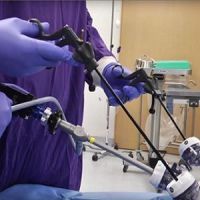Shared decision making helps create a more patient-centred process. Now a new study finds that patients became more engaged in their anaesthesia and pain relief options after receiving "decision aids" in the form of informational brochures. The results were presented at the ANESTHESIOLOGY® 2015 annual meeting held in San Diego, California.
Surgery is serious and it's understandable for patients to worry about their anaesthesia care plan. In most cases, however, patients have a poor understanding of anaesthesia and desire more information about their options and post-operative pain management choices, according to Karen Posner, PhD, Anaesthesiology and Pain Medicine, University of Washington, Seattle.
For this study, 67 patients undergoing surgery with regional anaesthesia were given brochures that explained the different types of anaesthesia, risks and benefits. These brochures, which included space for questions and notes, were given to patients during a pre-anaesthesia clinic evaluation a few days or weeks prior to surgery. Another 59 similar patients were not given decision aids. Immediately after the clinic evaluation, a survey of patients in both groups was conducted to assess their knowledge of regional anaesthesia and the risks and benefits. The survey also aimed to measure patients' level of anxiety and uncertainty.
Researchers found patients who received decision aids were more likely to discuss their anaesthesia options during clinic visits. Survey results showed that 64 percent of patients who received brochures discussed regional anaesthesia with clinic staff compared to 49 percent of those who did not get a decision aid. Patients who received a brochure were more likely to discuss their anaesthesia choices (78 percent versus 52 percent).
In addition, 70 percent of patients who received brochures asked questions about regional anaesthesia compared to only one third (32 percent) of the comparison group. Although the brochures included risk information, that information did not increase anxiety and uncertainty in the group who received them, the researchers noted.
“Clearly, more information is always helpful,” Dr. Posner points out. “Helping patients understand their choices allows them to feel fully prepared to discuss their options and make a mutually agreed upon decision in partnership with their physician anaesthesiologist.”
Source: American Society of Anesthesiologists
Image credit: Flickr.com
Surgery is serious and it's understandable for patients to worry about their anaesthesia care plan. In most cases, however, patients have a poor understanding of anaesthesia and desire more information about their options and post-operative pain management choices, according to Karen Posner, PhD, Anaesthesiology and Pain Medicine, University of Washington, Seattle.
For this study, 67 patients undergoing surgery with regional anaesthesia were given brochures that explained the different types of anaesthesia, risks and benefits. These brochures, which included space for questions and notes, were given to patients during a pre-anaesthesia clinic evaluation a few days or weeks prior to surgery. Another 59 similar patients were not given decision aids. Immediately after the clinic evaluation, a survey of patients in both groups was conducted to assess their knowledge of regional anaesthesia and the risks and benefits. The survey also aimed to measure patients' level of anxiety and uncertainty.
Researchers found patients who received decision aids were more likely to discuss their anaesthesia options during clinic visits. Survey results showed that 64 percent of patients who received brochures discussed regional anaesthesia with clinic staff compared to 49 percent of those who did not get a decision aid. Patients who received a brochure were more likely to discuss their anaesthesia choices (78 percent versus 52 percent).
In addition, 70 percent of patients who received brochures asked questions about regional anaesthesia compared to only one third (32 percent) of the comparison group. Although the brochures included risk information, that information did not increase anxiety and uncertainty in the group who received them, the researchers noted.
“Clearly, more information is always helpful,” Dr. Posner points out. “Helping patients understand their choices allows them to feel fully prepared to discuss their options and make a mutually agreed upon decision in partnership with their physician anaesthesiologist.”
Source: American Society of Anesthesiologists
Image credit: Flickr.com
Latest Articles
healthmanagement, surgery, anaesthesia, brochures, patient-centred, decision-making, informed decisions
Shared decision making helps create a more patient-centred process. Now a new study finds that patients became more engaged in their anaesthesia and pain relief options after receiving "decision aids" in the form of informational brochures. The results we



























